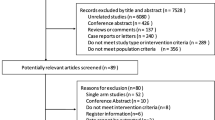Abstract
Purpose
The use of concurrent chemoradiotherapy is frequently recommended in the treatment of locally advanced rectal cancer; however, the ideal chemotherapy regimen remains unknown, and there is variability in chemotherapy agents used among different institutions. We sought to examine differences in overall survival between patients receiving single versus multiple-agent concurrent chemoradiotherapy.
Methods
The National Cancer Database was used to identify 31,025 patients with rectal cancer who received concurrent chemoradiotherapy between 01/2006 and 12/2016. We compared patients who received single-agent chemotherapy with those who received multiple-agent concurrent chemoradiotherapy. The primary outcome of interest was overall survival. The groups were compared using univariate analysis and Cox proportional hazard models to adjust for potential confounding factors.
Results
18,544 patients received single-agent and 12,481 patients received multiple-agent chemotherapy. The former were older with more comorbidities as evidenced by their higher Charlson-Deyo Scores. Those receiving multiple-agent chemotherapy were more likely to have clinical stage III disease (52.9% vs 43.3%, p < 0.001) and less likely to have well-differentiated cancer (6.9% vs 7.7%, p < 0.001). The rates of negative resection margin were identical (p = 0.225) between the two groups. On multivariable analysis after adjusting for comorbidities, radiation dose, and resection margins, single-agent chemotherapy was associated with worse overall survival (HR 1.09, 95% CI 1.057–1.124, p < 0.001).
Conclusion
Multiple-agent chemoradiotherapy is associated with improved overall survival in locally advanced rectal cancer; however, chemotherapy regimen does not affect resection margins. The modest overall survival benefit with multiple-agent chemotherapy must be balanced with the potential associated toxicity.

Similar content being viewed by others
Availability of Data and Material
From the corresponding author upon reasonable request.
References
Sebag-Montefiore D, Stephens RJ, Steele R, et al. Preoperative radiotherapy versus selective postoperative chemoradiotherapy in patients with rectal cancer (MRC CR07 and NCIC-CTG C016): a multicenter, randomized trial. Lancet. 2009;373:811–20.
Van Gijn W, Marijnen CA, Nagtegaal ID, et al. Preoperative radiotherapy combined with total mesorectal excision for resectable rectal cancer: 12-year follow-up of the multicenter, randomized controlled TME trial. Lancet Oncol. 2011;12:575–82.
National Comprehensive Cancer Network. Rectal Cancer (Version 6.2020). Retrieved from https://www.nccn.org/professionals/physician_gls/pdf/rectal.pdf.
Bosset JF, Collette L, Galais G, et al. Chemotherapy with preoperative radiotherapy in rectal cancer. N End J Med. 2006;355:1114–23.
Bonnetain F, Bosset JF, Gerard JP, et al. What is the clinical benefit of preoperative chemoradiotherapy with 5FU/leucovorin for T3–T4 rectal cancer in a pooled analysis of EORT 22921 and FFCD 9203 trials: surrogacy in question? Eur J Cancer. 2012;48:1781–90.
Rodel C, Liersch T, Becker H, et al. Preoperative chemoradiotherapy and postoperative chemotherapy with fluorouracil and oxaliplatin versus fluorouracil alone in locally advanced rectal cancer: initial results of the German CAO/ARO/AIO-04 randomized phase 3 trial. Lancet Oncol. 2012;13:679–87.
Rodel C, Graeven U, Fietkau R, et al. Oxaliplatin added to fluorouracil-based preoperative chemoradiotherapy and postoperative chemotherapy of locally advanced rectal cancer (the German CAO/ARO/AIO-04 study): final results of the multicenter, open-label, randomized, phase 3 trial. Lancet Oncol. 2015;16:979–89.
Aschele C, Cionini L, Lonardi S, et al. Primary tumor response to preoperative chemoradiation with or without oxaliplatin in locally advanced rectal cancer: pathologic results of the STAR-01 randomized phase III trial. J Clin Oncol. 2011;29:2773–80.
Rodel C, Hofheinz R, Fokas E. Rectal cancer: neoadjuvant chemoradiotherapy. Best Pract Res Clin Gatroenterol. 2016;30:629–39.
Gerard JP, Azria D, Gourgou-Bourgade S, et al. Comparison of two neoadjuvant chemoradiotherapy regimens for locally advanced rectal cancer: results of the phase III trial ACCORD 12/0405-Prodige 2. J Clin Oncol. 2010;28:1638–44.
Gerard JP, Azria D, Gourgou-Bourgade S, et al. Clinical outcome of the ACCORD 12/0405 PRODIGE 2 randomized trial in rectal cancer. J Clin Oncol. 2012;30:4558–65.
Allegra CJ, Yothers G, O’Connell MJ, et al. Neoadjuvant 5-FU or capecitabine plus radiation with or without oxaliplatin in rectal cancer patients: a phase III randomized clinical trial. J Natl Cancer Inst 2015;107:djv248.
Hong YS, Kim SY, Lee JS, et al. Oxaliplatin-based adjuvant chemotherapy for rectal cancer after preoperative chemoradiotherapy (ADORE): long-term results of a randomized controlled trial. J Clin Oncol. 2019;37:3111–23.
Hong YS, Nam BH, Kim KP, et al. Oxaliplatin, fluorouracil, and leucovorin versus fluorouracil and leucovorin as adjuvant chemotherapy for locally advanced rectal cancer after preoperative chemoradiotherapy (ADORE): an open-label, multicenter, phase 2, randomized controlled trial. Lancet Oncol. 2014;15:1245–53.
Hofheinz RD, Arnold D, Fokas E, et al. Impact of age on the efficacy of oxaliplatin in the preoperative chemoradiotherapy and adjuvant chemotherapy of rectal cancer: a post hoc analysis of the CAO/ARO/AIO-04 phase III trial. Ann Oncol. 2018;29:1793–9.
Funding
No funding or external support was received for this study.
Author information
Authors and Affiliations
Contributions
TP and RR conceived and designed the research project. CS and RR collected the data used. TP and RR did the statistical analysis of the data. TP, CS, JC, CC, RG, DB, AP, LB, HK, TF, and RR performed a critical interpretation of the data. TP and RR wrote the initial version of the manuscript. CS, JC, CC, RG, DB, AP, LB, HK, and TF reviewed, edited the manuscript, and contributed to its final form. All authors read and approved the final manuscript.
Corresponding author
Ethics declarations
Ethics Approval
Our study protocols were considered exempt by our Institutional Review Board.
Conflict of Interest
The authors declare no competing interests.
Additional information
Publisher's Note
Springer Nature remains neutral with regard to jurisdictional claims in published maps and institutional affiliations.
Rights and permissions
About this article
Cite this article
Peponis, T., Stafford, C., Cusack, J. et al. The Use of Single-Agent Versus Multiple-Agent Concurrent Chemoradiotherapy in the Treatment of Locally Advanced Rectal Cancer. J Gastrointest Canc 53, 557–563 (2022). https://doi.org/10.1007/s12029-021-00657-3
Accepted:
Published:
Issue Date:
DOI: https://doi.org/10.1007/s12029-021-00657-3




